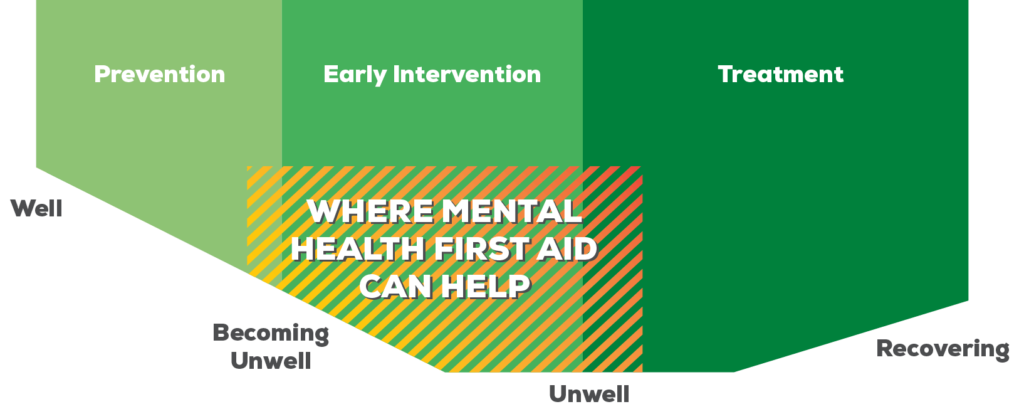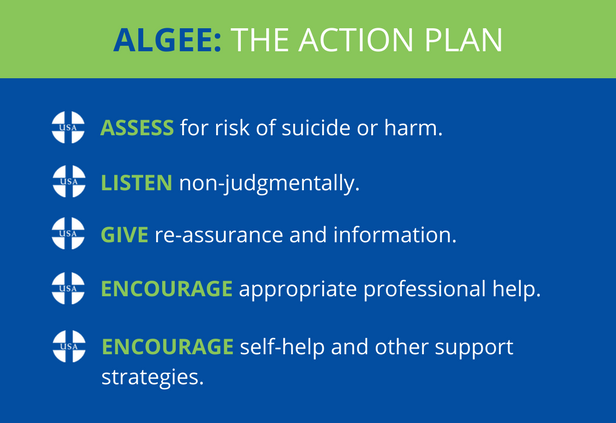A multi-faceted approach to wellbeing
We all have mental health, and 1 in 4 of us will experience a mental health issue in any given year. It’s extremely important for us to safeguard ourselves and our communities and learn the skills to support an individual developing mental health issues or in a mental health crisis.
WCDB’s mental health first aid training is designed to empower people with the knowledge to help a person who is ill or injured before professional medical treatment can be obtained. While the programme focuses on providing immediate help when it’s required, it also aims to contribute towards the following areas:
- Eliminating stigma and discrimination
- Reducing the period of untreated mental ill health through earlier detection
- Preventing suicide through raising awareness of risk factors
- Raising awareness and promoting mental health and wellbeing
- Promoting and supporting recovery and social inclusion for people who have experienced mental ill health.
Creating a safe and open environment for everyone
There are many dangerous myths and misunderstandings about mental health issues, and the stigma associated with mental health can create negative attitudes and behaviours. This is one of many reasons why 70-75% of people with diagnosable mental illness receive no treatment at all.
Our programmes create a safe and open environment whereby conversations about mental health can occur, with an aim to reduce prejudice and discrimination through a better understanding of the experiences of people with mental health issues.
Addressing mental health needs across the spectrum of intervention

Mental health first aid is just one of a suite of interventions for preventing mental health issues and helping people with mental illness. The programme is especially effective at early intervention, but the skills learnt in the MHFA course can be used at any point along the spectrum.
- Prevention: Encourage self-help strategies when someone is feeling stressed, tense, irritable or unhappy.
- Early Intervention: Have a supportive conversation with someone about recent changes in their behaviour that suggest they are experiencing poor mental health.
- Treatment: Address crises or relapses once the person is receiving treatment.
Research shows a higher return on investment can be achieved by early interventions, such as organisation-wide culture change and education.
Engaging & Practical Programmes
A first aid course is a remarkably effective, relatively fast and cost efficient way to combat mental ill health through a practical and actionable programme. It also enables those trained to do so to provide immediate assistance to individuals who may already be experiencing mental ill health.
Our programmes are designed for individuals working with both adults and youth and teach first aid skills applicable in any workplace including corporate offices, schools and academies, global and/or remote companies, and many more.
Adult & Youth Workplace Programmes
We believe mental health in the workplace is a journey, not a destination. Our services offer an end-to-end experience for your business, providing the support you need pre-, during, and post- the completion of the mental health first aid programme.
Discovery
Our discovery period seeks to identify your organisations unique needs and challenges and where you are on your mental health journey.
Programme Outlines
While the content of the accredited course is universal, our delivery is focused on the unique needs identified during the period of discovery.
The active programme addresses different areas of mental health, provides context on risk factors, identifies warning signs and symptoms, highlights key facts and figures, and demonstrates the practical application of the ALGEE framework.

The outlines below introduce the course content for Adult & Youth Workplaces at a very high-level, please get in touch with us for more information about the programmes.
Adult Programme Outline
- Session 1 introduces the MHFA action plan, impact of mental health issues, and how stigma and discrimination are impacted by wider inequalities in society.
- Session 2 addresses first aid for suicidal crises, how to apply non-judgemental listening skills, and treatments and resources for depression.
- Session 3 addresses crisis first aid after a traumatic event, first aid for anxiety disorders, and cognitive distortions and CBT (cognitive behaviour therapy).
- Session 4 addresses action planning for using MHFA and building a mentally healthy community.
Youth Programme Outline
- Session 1 introduces the MHFA action plan, context on England’s child health care policy, risk factors for mental ill health, and preventing mental health issues and promoting wellbeing.
- Session 2 addresses signs and symptoms of depression and anxiety, risk factors, and contextual facts and figures.
- Session 3 addresses suicide and psychosis, first aid for suicidal crisis, and different types of psychotic disorder.
- Session 4 addresses self-harm and eating disorders, risk factors, signs and symptoms, and recovery.
After-care
- Become part of the WCDB community where you receive relevant resources tailored to your needs and periodic updates on best practices.
- Next steps (if applicable) with access to recommended and vetted professional partners including therapists and psychologists.